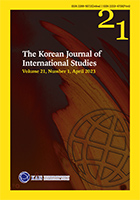
Background
The Korean Association of International Studies (KAIS) was established in 1956 by Korean political scientists who recognized both the importance of international relations for South Korea and the discipline’s distinct scope and methodology. From its inception, KAIS has remained free from ideological bias and political partisanship, maintaining independence from political parties and administrations. For more than six decades, the association has successfully upheld these founding principles.
Since its early beginnings with fewer than ten members, KAIS has grown into one of the most prominent academic associations in Korea, now comprising more than 2,400 individual and institutional members. It has consistently organized annual meetings, international conferences, and special seminars on a wide range of topics in domestic and foreign policy.
The association publishes two academic journals—one in Korean and one in English—and has also produced a wide array of books and textbooks in the field of international studies, making significant contributions to the quality and advancement of scholarship in this area.
Beyond academic publishing, KAIS has also served important theoretical and policy functions, supporting both the South Korean government and universities. Thanks to its achievements, the dedication of its members, and its adherence to scholarly independence, KAIS today stands as one of the most respected and representative academic associations in Korea.
In 1963, KAIS launched The Korean Journal of International Relations (KJIR), its flagship Korean-language journal, which has since published some of the country’s most influential research in international relations.
In 2003, KAIS began publishing an English-language journal under the same title. In 2010, the journal was restructured to strengthen its academic focus and enhance its quality, and was renamed The Korean Journal of International Studies (KJIS).
KJIS is the official English-language journal of KAIS and is widely recognized as a leading outlet for scholarship in international studies. It has published high-quality research in international relations, foreign policy, comparative politics, and area studies, making notable contributions to academic debates while also shaping national policy and public opinion both within Korea and internationally.
Aims and Scope
The Korean Journal of International Studies (KJIS) is the official peer-reviewed journal of the Korean Association of International Studies (KAIS).
Published three times a year (April, August, and December), the journal focuses on global and regional affairs as well as theoretical debates in international relations and area studies.
KJIS is indexed in SCOPUS, the Emerging Sources Citation Index (ESCI), Social SciSearch, the Journal Citation Reports / Social Sciences Edition, and the Korea Citation Index (KCI), ensuring broad visibility and academic impact.
The journal welcomes original research articles that address both enduring issues in East Asia—including those concerning the Korean Peninsula—and the broader implications of global and regional dynamics from diverse theoretical and methodological perspectives.
KJIS covers a wide range of topics, including international security, political economy, regionalism, environmental challenges, migration, civil society, and multiculturalism. It does not adhere to any single theoretical or methodological orientation, instead encouraging scholarly diversity across conceptual, normative, and empirical research.
By promoting high-quality scholarship, KJIS provides a valuable platform for academic exchange and aims to contribute meaningfully to both scholarly debates and policy discussions. The journal also seeks to offer policymakers worldwide in-depth analyses and thoughtful policy alternatives on contemporary global issues.
Publication Schedule
KJIS is published three times a year, according to the following schedule :
• April 30 (Submission deadline : January 31)
• August 31 (Submission deadline : May 31)
• December 31 (Submission deadline : September 30)
Indexed in : KCI, ESCI, SCOPUS
|
